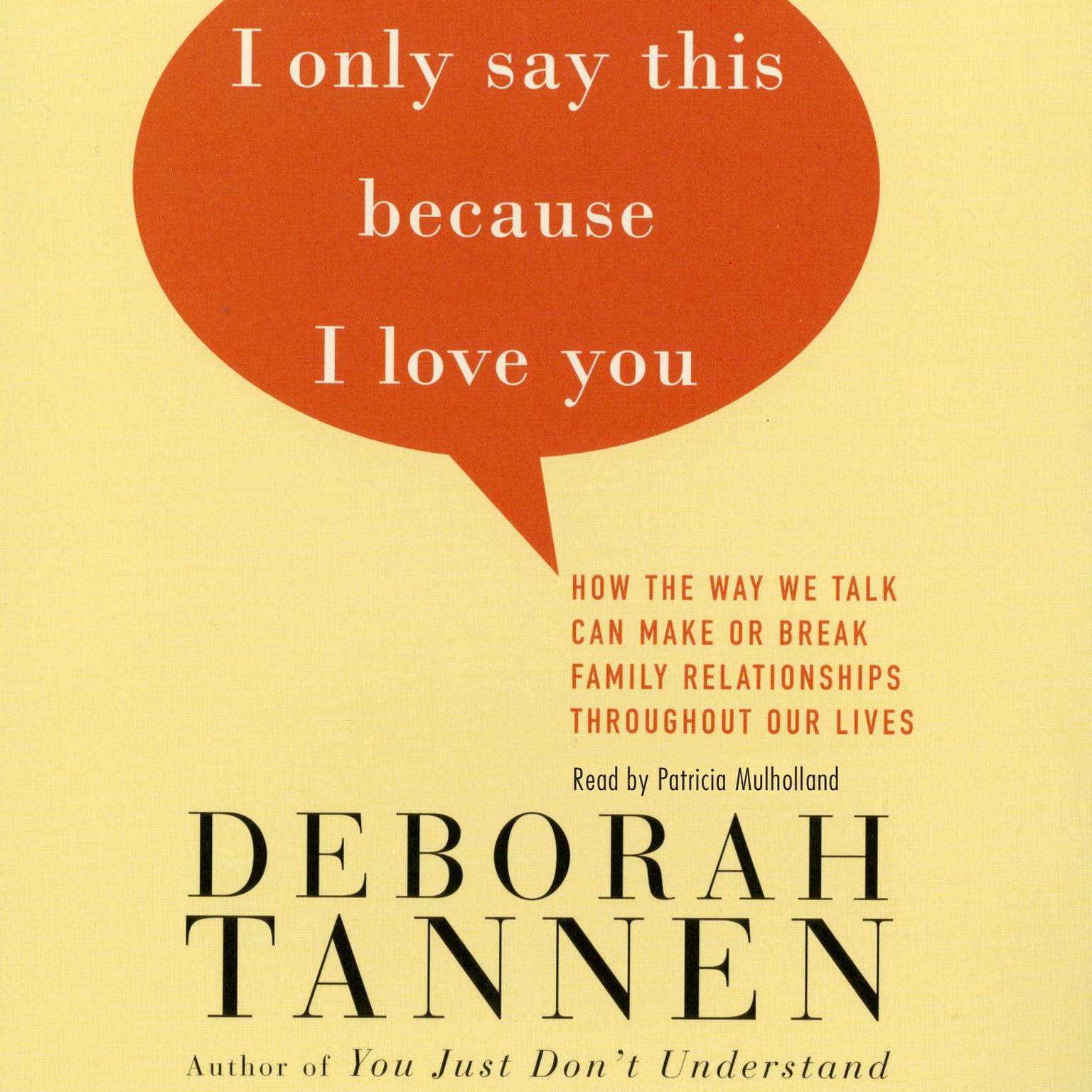 Play Audiobook Sample
Play Audiobook Sample
I Only Say This Because I Love You: Talking In Families Audiobook
 Play Audiobook Sample
Play Audiobook Sample
Quick Stats About this Audiobook
Total Audiobook Chapters:
Longest Chapter Length:
Shortest Chapter Length:
Average Chapter Length:
Audiobooks by this Author:
Publisher Description
Why does talk in families so often go in circles, leaving us tied up in knots? Linguist Deborah Tannen reveals why talking to family members is so often painful and problematic -- even when we're all adults.
Searching for signs of acceptance and belonging, we find signs of disapproval and rejection. Why do the seeds of family love so often yield a harvest of criticism and judgment? In I Only Say This Because I Love You, Tannen shows how important it is, in family talk, to learn to separate word meanings, or messages, from heart meanings, or metamessages -- unstated but powerful meanings that come from the history of our relationships and the way things are said.
Presenting real conversations from people's lives, Tannen explores what is actually going on in family talk, including how family conversations must balance the longing for connection with the desire for control, as we struggle to be close without giving up our freedom.
This eye-opening audiobook explains why grown women so often feel criticized by their mothers -- and why mothers feel they can't open their mouths around their grown daughters, why growing up male or female, or as an older or younger sibling, results in different experiences of family that persist throughout our lives. BY helping us to understand and redefine family talk, Tannen provides the tools to improve relationships with family members of every age.
Download and start listening now!
"When I lend it, people fall in love. It's a good way to break problematic communications patterns and deal with difficult family members."
— Selika (5 out of 5 stars)
Quotes
-
“Parents of teenagers may also find some good insights in Tannen’s clear-sighted analysis of how clashing frames of reference undermine communication.”
— Publishers Weekly -
“Tannen inspects the ‘metamessages’ of family communications, the unstated meanings behind what is said. She demonstrates the layers of meaning, advises readers on metacommunications—that is, talking about ways of talking—and considers how to change how one communicates with family members. A fascinating book for quite a variety of readers.”
— Booklist -
“A fine stimulant to conversation, constructive argument, and research.”
— Library Journal
I Only Say This Because I Love You Listener Reviews
-
" didn't finish..but read enough to get the main points of it. Now, I see myself thinking of the book a lot when I communicate with others. the alignment theory is very interesting. "
— Caroline, 1/5/2014 -
" Commonsensical but very good read. "
— Laura, 12/18/2013 -
" Really just skimmed this but some of the points were interesting. "
— Christine, 11/10/2013 -
" After the few first chapters of the book explained the dual communication embedded in every conversation: literal message and metamessage, as well as illustrating each conversation's ability to create alignments of power and connection between participants, the text became repetitious. "
— Donna, 4/28/2013 -
" Very helpful to know about the usual and different ways and styles people communicate. Had to laugh about the differences in the ways boys and girls talk. So true!!! Loved it. "
— Marita, 4/5/2013 -
" Some valuable tips for awkward, sometimes necessary conversations. "
— Eric, 1/25/2013 -
" Good real life examples of communication breakdowns but I was hoping for more suggestions and ideas on improving communication to strengthen relationships. "
— Jan, 7/4/2012 -
" it's a great book ^^ "
— Apple, 6/26/2012 -
" It was easy to read. I now know what my siblings think of me. "
— Diane, 4/21/2012
About Deborah Tannen
Harvard Business Review is the leading destination for smart management thinking. Through its flagship magazine, eleven internationally licensed editions, books from Harvard Business Review Press, and digital content and tools published on HBR.org, Harvard Business Review provides professionals around the world with rigorous insights and best practices to lead themselves and their organizations more effectively and to make a positive impact.


















